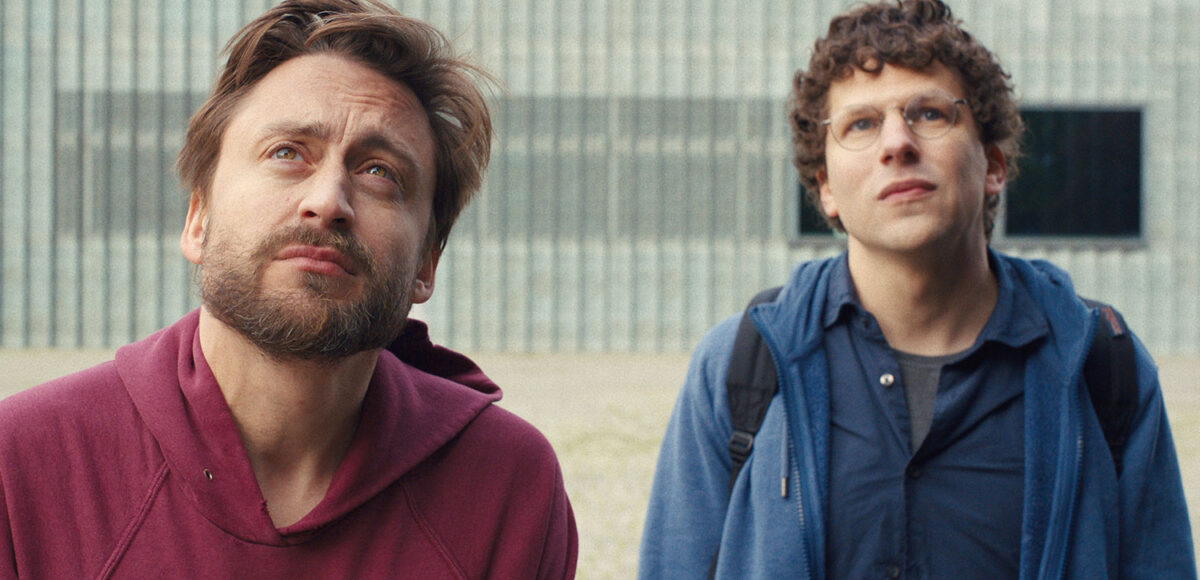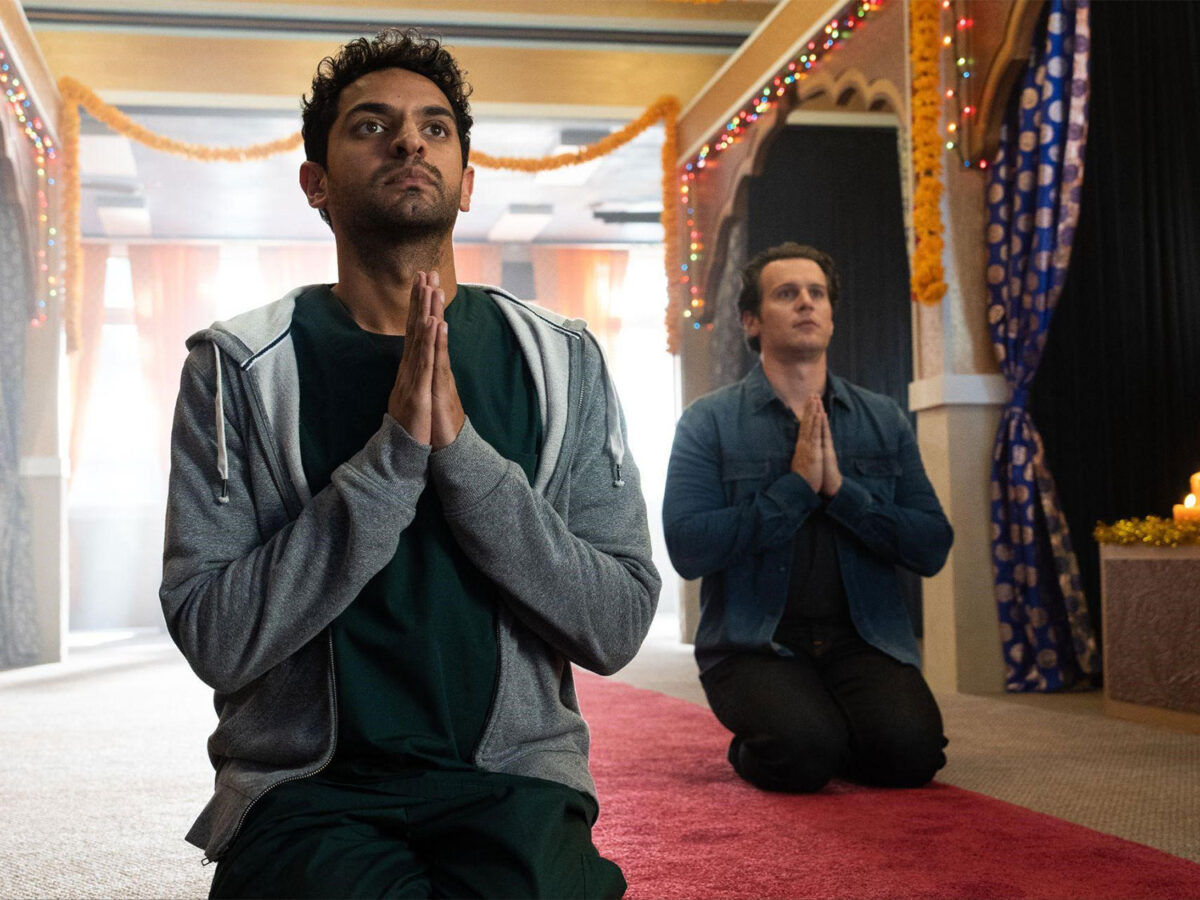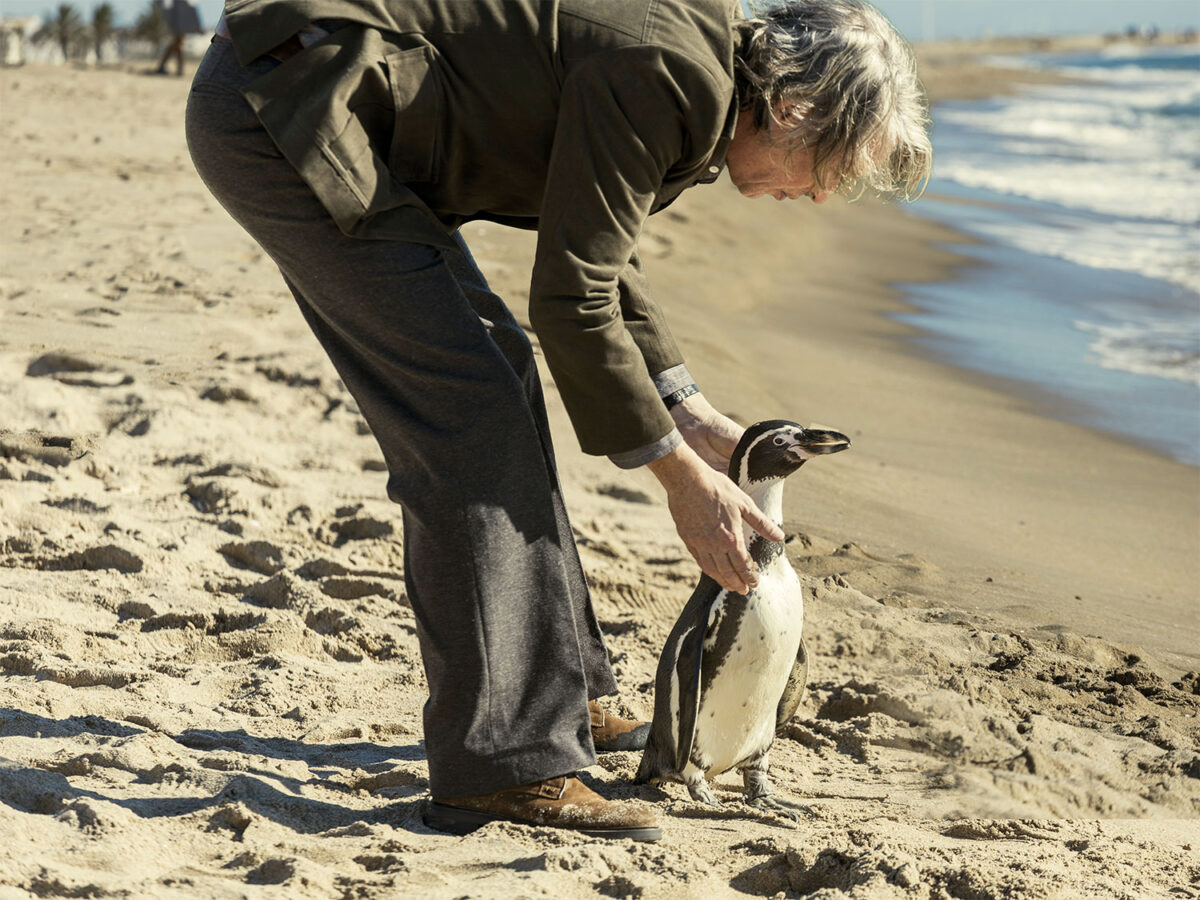In “A Real Pain,” Kieran Culkin stars with Jesse Eisenberg, who also wrote and directed, as cousins trying to make a connection, both to each other and their family heritage. Growing up together they were very close, but life took different turns for them and they are no longer. David (Eisenberg) is self-contained, buttoned up, a tightly wound instrument. Benji (Culkin) can’t stay on target, has never seen a rule he didn’t want to break and refuses to conform to the expectations of others. David is a successful tech engineer with a wife and adorable child. Benji still lives in his parent’s basement and hasn’t been consistently employed in a long time, if ever. They’re aware of their own shortcomings but see little need to address them. Oil and water and yet each sees value in the other even if they are incapable of expressing it.
David and Benji are on a mission together. They were left money by their cherished grandmother to visit the Poland of her youth, the home where she was happy until the Holocaust upended her life. She survived and had a fulfilling life in New York, bonding with her two grandsons, especially Benji, who benefitted from her tough love and attention and feels her loss more acutely. They have spent that money on a tour of Poland focusing on Jewish heritage. Their ultimate goal is to find their grandmother’s house.
The dynamic between the two men is established immediately. David has texted Benji repeatedly, dozens and dozens of times, about meeting at the airport. Benji responded to none of them, fully confident that they’d find each other before they boarded. When, on the plane, Benji convinces David to take the middle seat, it is immediately noted that Benji knows how to get what he wants and David is missing the self-protection gene. Meeting up with their tour group in Warsaw, Benji quickly establishes himself as a friendly antagonist. He is a flag planter and it’s usually on top of David that he plants it. But he’s also a charmer, and even when he inconveniences the group or directs unnecessary criticism at their amiable guide, he is forgiven. David is clearly annoyed at these antics, but he is also envious because he has never been able to confront anything directly. That he has lived his life avoiding conflict is more than apparent.
Both Benji and David are very disapproving and envious of each other. Disapproving because Benji says whatever comes into his head at the time without a filter; disapproving because David is unable to tap into any emotions that the tour should bring out, even during the tour of a concentration camp; envious for similar reasons just because Benji reacts on a visceral level and David, holds back, allowing his observations to color his response. They each express and feel pain in direct proportion to their abilities to feel emotions—Benji feels everything and David, seemingly, little. But, of course, it’s not as simple as that.
Emotional pain is experienced in different ways. Just because Benji is an unfiltered jerk, both to his cousin and the other members of the group, doesn’t negate his positive qualities. Those positive qualities are very tied to his negative ones, making him almost impossible to be around and impossible not. David is so bottled up that he is almost incapable of opening himself up to the past. His empathy for the suffering of others is almost rote. David is a here and now kind of person. He lives for his wife and child; he loved his grandmother as a person who cared for him. He finds it difficult to relate to past events in anything but a historical context. Benji improvises through life; David follows a script. Each man is a pain to the other, each suffering his own brand of pain.
This could have been a great character study of two men who are different sides of the same coin. On the positive side, Culkin and Eisenberg are playing characters they know so well. On the negative side, Culkin and Eisenberg are playing characters they know so well and have done repeatedly, right down to the identifiable speech cadences. Culkin has channeled Roman Roy from “Succession” at his best and worst. Although not exhibiting any new dimension, he makes it hard not to focus on his character and the ways in which he unsuccessfully hides his difficulties. Jesse Eisenberg stays within his already well-established wheelhouse of the repressed, almost OCD personage whose brain is constantly whirling in facts and numbers but not in emotions. Both men reveal their shortcomings, but it’s Culkin who gives us a more fully developed character.
Eisenberg’s intention was not just to explore the differences and ultimate love the cousins have for each other but to do it in the context of spiritual identity against the backdrop of today’s Poland. Unintended, but the locations were only settings for the two men’s interactions with no insight into the significance of these sites. He has, instead, made a scenic travelogue with little insight into the country.
Neither has much in common with the members of their group, although both bond with Eloge (Kurt Egyiawan), a convert to Judaism and a refugee from the Rwandan genocide who found a new home in Canada where he felt embraced by the grace, empathy and faith of the Jewish community. His quiet humility allowed both men, at least briefly, to contemplate what it means to find community in the aftermath of tragedy, bringing their grandmother’s suffering and survival into focus. All of the other actors portraying the tour group members are only along for the ride, including Jennifer Grey, who portrays Marsha, the L.A. divorcee trying to discover her roots. Even Will Sharpe as James, the amiable tour guide leader, has little to do other than provide narrative for the sites, much like you might get on a Hop-On Hop-Off bus. They are wallpaper for the leads. Although Eisenberg based this film on his own travels, searching for his family’s history in Poland, the personal touch seems missing.
Cinematographer. Michal Cymek, an award winner for the enchanting “EO,” filmed his native Poland lovingly. It is significant, however, that Eisenberg steered clear of Poland’s ever-present antisemitic history, avoiding most of Poland’s past and present.
Opening Nov. 1 at AMC Century City 15 with a Q&A with Jesse Eisenberg and Kieran Culkin; Nov. 2 with a Q&A with Jesse Eisenberg.
Neely Swanson spent most of her professional career in the television industry, almost all of it working for David E. Kelley. In her last full-time position as Executive Vice President of Development, she reviewed writer submissions and targeted content for adaptation. As she has often said, she did book reports for a living. For several years she was a freelance writer for “Written By,” the magazine of the WGA West, and was adjunct faculty at USC in the writing division of the School of Cinematic Arts. Neely has been writing film and television reviews for the “Easy Reader” for more than 10 years. Her past reviews can be read on Rotten Tomatoes where she is a tomato-approved critic.







